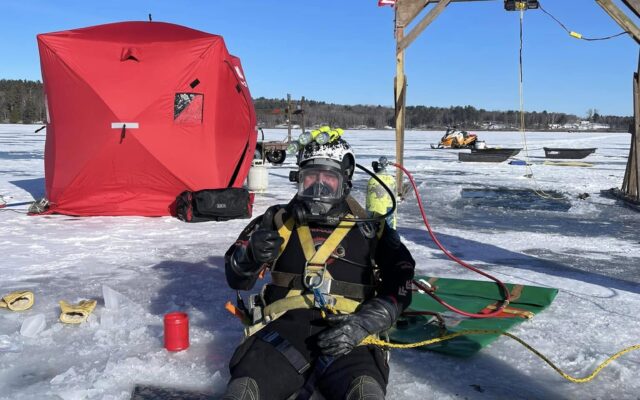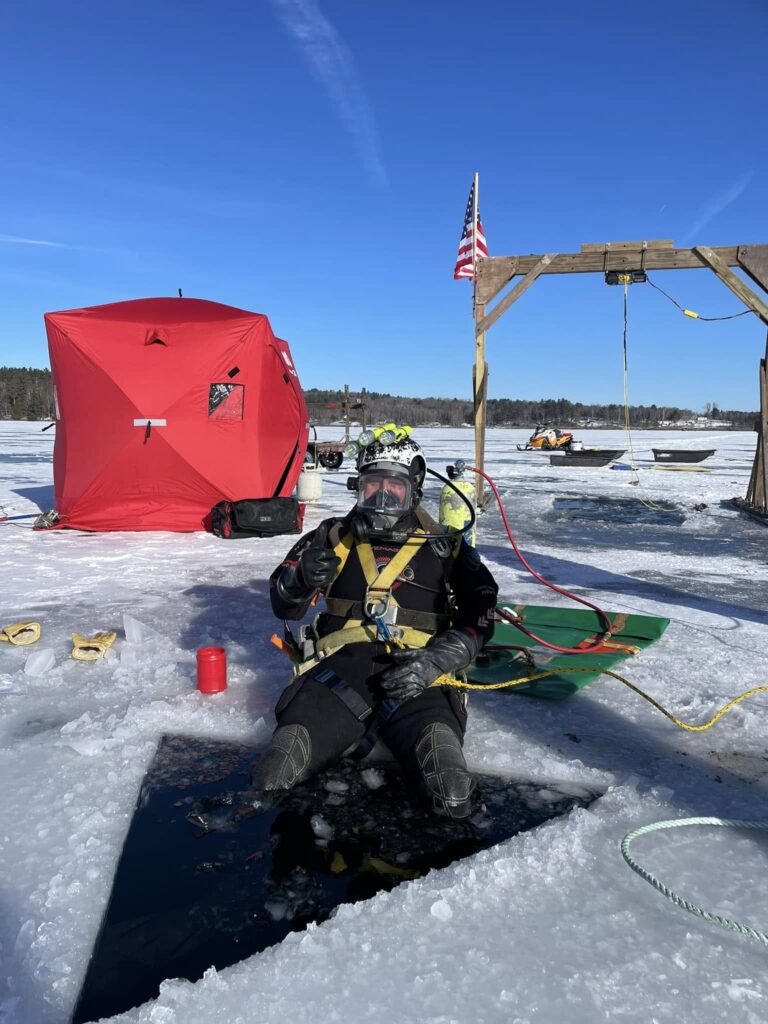
How a Maine ice diver raised a U-Haul from the bottom of a frozen lake
By Elizabeth Walztoni, Bangor Daily News Staff
The man Mainers call when they lose something below the surfaces of frozen lakes is having a very unusual year.
Greg Canders, of Bangor, typically gets between two and nine calls each January. This year, he’s had five, but they’ve been more unique than the lost snowmobiles and ATVs that typically make up his winter work.
It’s hard for him to say what’s “normal” in his line of work, but so far 2025 has found Canders hauling a U-Haul out of a lake, finding a pair of Bucksport-area dogs who fell through river ice, and floating a snowmobile up through 180 feet of water — all while recovering from a broken arm.
Ice conditions have become less predictable in Maine and can determine how many calls he gets. And the job connects him to new people and places across Maine while reuniting them with things they care about, he said.

SNOWMOBILE RETRIEVAL — Greg Canders at work retrieving a snowmobile that crashed through the ice of Lake Wassookeag Dexter in January. Canders uses helium bags to float lost vehicles from the bottom of Maine lakes and ponds.
“It’s always rewarding to find something that someone has lost and it means a lot to them or has sentimental value,” he said.
Canders started diving in 1970, when as a 16-year-old he won scuba lessons in a raffle at a sportsman’s show in the former Bangor Auditorium. He loved finding surprises on the bottoms of lakes and the peaceful experience beneath the surface. Then he started finding lost items for other people.
“’I never know what I’ll be asked to get after,” he said.
That led him to learn ice diving about a decade later. With the surface of the water protected from wind, it’s an even more peaceful experience. He’s recovered outdoor vehicles as large as a full-sized John Deere skidder and snow grooming equipment used for trails.
Canders has been featured on the TV show “It’s a Miracle,” reenacting his discovery of a wristwatch a Dedham woman lost decades before. He also appeared in a book after finding the wedding ring that a former BDN columnist’s husband lost in a swimming hole near Katahdin.
While Canders’ work can be heartwarming, his latest dive was one of the saddest, he said: bringing two lost dogs to the surface of the Narramissic River. They fell through the ice two days before and 11 area firefighters were unable to recover them, the Ellsworth American reported.
The dogs’ owner told the American she was thankful for the community support.
Earlier in January, Canders hauled up a two-person side-by-side in Newport, a snowmobile in Dexter that a father and son escaped from, a four-person side-by-side, and a U-Haul truck that fell through 5 inches of ice after being driven 450 yards onto Mount Desert Island’s Echo Lake.
Weighing roughly 5,700 pounds, the empty 10-foot U-Haul needed 5,000 pounds of lift from the helium bags that float lost vehicles from the bottom, Canders said. That’s about 10 times the volume an average snowmobile takes. The truck initially sank 20 feet underwater, then to 50 feet after a cable snapped during a towing attempt.
Canders has developed his own mechanical lifting process over the years, starting with a pair of uneven stepladders that held up a winch for his first snowmobile recovery. Now, a collapsible frame supports the equipment.
Once he’s floated the vehicle, Canders finds a spot where the ice is thick enough to carry its weight, cuts a new hole, pulls on a tow line attached to the vehicle and slides it up and out of the water with the winch system.
In his many years of work, the diver has encountered two mindsets that lead people to fall through. Some aren’t familiar with the body of water or how to determine if it’s safe.
Others have been ice fishing or snowmobiling in the same place for decades and learned to expect safe conditions when the season starts. But winter weather is now consistently staying warmer for longer and causing more freeze-thaw cycles.
Many Maine lakes still ice over in December, according to Lake Stewards of Maine, a volunteer group that tracks “ice in” dates. But since 2005, there have been more years when that doesn’t happen until January or even February. Ice is often thinner in December than it used to be and disappears earlier in spring.
The thickness may also vary dramatically in the same lake. For example, large rocks can absorb sunlight and melt inches of ice above them, Canders said.
Drivers further risk falling through when they cross over pressure ridges, which form when ice pushes up due to changing temperatures. Ridges can cause the ice to thin or even break.
Whatever does fall into the water, Canders is game to find it.
“I’ve had a lot of great experiences, seen a lot of great places and met a lot of great people” through diving, he said.